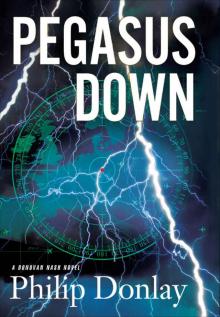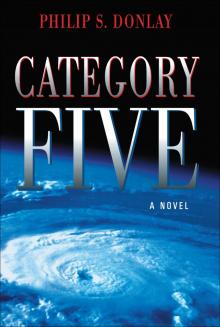- Home
- Philip Donlay
Category Five Page 9
Category Five Read online
Page 9
“Call them. See if they can read us.” Donovan waited as Michael did as instructed.
“Nothing.” Michael shook his head.
“Did you get any kind of position?” Donovan asked quickly.
“What I hear is mostly static.” Michael adjusted the volume. “I can make out the Mayday. I think maybe they’re also saying the name of a ship. The voice is heavily accented, Russian I’d bet, but the Mayday is definitely English.”
Donovan keyed the intercom to the cabin area and spoke quickly to James Holland, the lead scientist in the back of the plane. He and James had known each other for years, had flown dozens of mission together.
“James. We’re picking up a distress call on the UHF radio. Tune in 243.0. Any way you can get it on tape?”
“Stand by.”
Donovan and Michael exchanged concerned looks while they listened to frantic calls from an unknown voice.
“We’ve got it,” James reported. “Tapes rolling. We all agree it’s Russian.”
“Michael. Talk to air traffic control, see if there’s any other aircraft in the area. Find out if any surface ships are responding.”
Donovan kept thinking that there had to be a way to make sure the people in peril were being heard. “James, can you figure out a way to relay this distress call to someone who can translate it?”
“I’m already working on that. We’re establishing a data link with Elmendorf Air Force base in Anchorage. With any luck we should have some results momentarily.”
“Donovan.” Michael turned in his seat. “Air traffic control says this is the first they’ve heard of a distress call. We’re pretty far north of the commercial tracks. The closest plane is an Air Force C-5 Galaxy. But they’re almost 200 miles south of us.”
“I want to talk to the C-5 pilots.” Donovan’s heart began to pound in his chest. The mere thought of people in the water always brought on a private horror.
“You’re dialed in. Their call sign is Reach 321.”
Donovan nodded and keyed the microphone. “Reach 321, this is Eco-Watch 01. How do you read?”
“Loud and clear, Eco-Watch. What can we do for you?” The slight southern drawl filled the headset.
“We’re a research flight about 200 miles north of your position. We’re hearing a faint distress signal on UHF. Frequency 243.00. Can you tell me if you’re receiving the same call?”
“We’ll get right back to you on that.”
Donovan waited impatiently for the reply. He knew that each tick of the clock was precious; every minute in the water was like an hour in hell. He tried to keep his breathing slow and steady, despite his urgent thoughts screaming at him to hurry and do something—anything—to help those people.
“That’s negative on the distress call,” Reach 321 finally reported. “We don’t hear a thing.”
“Okay. Thanks.” Donovan turned to Michael. “My thinking is the Mayday is coming from farther north, or else the C-5 would have picked it up too.”
“I agree. Let’s go.” Michael keyed the microphone to advise air traffic control of their heading change.
Donovan reached up and spun the autopilot control knob. The Galileo responded immediately and banked toward the new heading.
“Talk to me, James. Tell me what we have.” Donovan needed more information.
“Hang on a second; we’re still putting this together.”
“You’ve got the airplane, Michael. I’m going back.”
Donovan threw off his harness and quickly swung out of the seat. He slid through the narrow cockpit door and hurried aft toward James’s position. He could see the scientist’s shiny bald head above the console. Half-moon reading glasses were positioned midway down his nose. He was writing furiously.
“Have you got it?”
James looked up and nodded. “Elmendorf just sent us the translation. “It’s a Russian Akula class nuclear submarine, the Drakon. They carry a crew of seventy-three. They’ve had a fire on board and they’re taking on water. They have no idea of their position.”
Donovan leaned on the steel frame supporting the equipment. “Can we somehow find out their last known position? Maybe we can make an educated guess where they might be.”
“Elmendorf is trying to contact the Russian Navy, and they’ve also talked to the Coast Guard. There aren’t any other ships in the area due to the storm. They have no idea where to even start looking,” James replied, frustration rising in his voice. “As far as anyone knows, we’re the only ones who’ve heard the SOS.”
Donovan looked into the expectant eyes of James and the two other scientists, then at the onboard equipment that stretched the length of the cabin.
“James. You said they’re on fire?”
“That’s what the translator at Elmendorf said. What are you thinking?”
“I’m wondering if it might be possible to use some of this high-priced hardware and get an infrared image from a satellite. Could we find a burning submarine in the middle of all this cold water?”
James’s eyes lit up and he instantly began to type commands to the computer.
Though calm and collected on the surface, inside, Donovan was anything but. He wasn’t afraid for himself or his crew. They were warm and dry, miles above the waves. He knew there was no safer place than in the ruggedly built Gulfstream. But the thought of sailors aboard a burning, sinking vessel, pulled at him from a very private part of himself.
“I think I might have something!” James cried out triumphantly. “Right here. This is from NOAA-12. It’s just a small dot really. I’ve enhanced it as much as I can. At first I thought it could be just a glitch, a ghost image—we get those from time to time during enhancement. But then I checked the same area from NOAA-14. Presto! The image is in the same place. I think this tiny speck is the sub, and the streak you can see is smoke.”
It had taken Donovan only a second to process the infrared image himself. It was far to the north.
“Get me the latitude and longitude. Tell Elmendorf what we’ve found, and inform them we’re going to assist. Find out how long until rescue elements can get there.”
“Will do,” James replied, quickly.
Donovan turned to head back to the cockpit, a million things going through his mind. How badly was the sub damaged? Were there men in the water?
“Any changes?” Donovan asked quickly as he took his seat.
“None. Hang on. I’m getting some coordinates from James.” Michael carefully wrote the numbers on his chart, then looked up at Donovan. “This is where they are?”
“It’s a Russian submarine. They’re on fire and taking on water. We’re the only ones who’ve heard the distress call.”
“I’ll read. You type,” Michael replied, solemnly. He paused until Donovan’s fingers were poised on the keyboard to the Flight Management System.
Donovan began to enter the crucial information. Once they loaded the information in the computers, they’d be able to lock in and fly directly to the crippled sub. He had carefully selected each number, then waited for Michael to verify the data.
“Couple it up. Let’s see how far we have to go.” Michael waited for the information to appear on the screen.
Donovan activated the new entry. In an instant, the FMS displayed the direct course to the sub. His earlier hunch had been correct; the distress call had come from the north.
“Bingo! They’re 240 nautical miles dead ahead.” Michael began comparing the electronic data against his chart.
“Tell air traffic control what we’re doing and where we’re going.” Donovan adjusted the heading slightly to counter the powerful winds at 41,000 feet. “We’ll also need clearance to descend down to a thousand feet when we get closer.”
Michael looked up from his map. “We’re going to be well inside Russian airspace when we reach the sub. Mind telling me what you plan on doing when we get there?”
“We’ve got,” Donovan gestured to the FMS, “twenty-two minutes to figure that out.�
��
“And less than ten minutes to spend overhead.” Michael too surveyed the data. “Otherwise we don’t have enough fuel to get back to Anchorage.”
“We’re going to need more time,” Donovan said, grimly. “Run some numbers and see how long we can stay with the sub and still make Cold Bay, or maybe King Salmon.”
Michael nodded. He keyed the microphone and quickly arranged the clearance that Donovan wanted. When he gave the controller the coordinates of the distress call, the calm voice warned him about operations within Russian-controlled airspace.
“They’ve cleared us as requested. We can descend at our discretion. Oh, and by the way, they warned us about playing too close to the Russians.”
Donovan smiled. The airspace violation was the least of their problems. He knew as well as Michael that if the Russians managed to get a fighter in the air, it was doubtful they’d be able to find a lone civilian Gulfstream in the middle of an Arctic storm.
“Okay. Let’s go over a few things. Then you’ll have some work to do in the back of the plane before we start down.” Together, he and Michael quickly discussed their fuel situation and tried to plan some contingencies. Once that was finished, they went over a hastily laid plan to save the Russian sailors. Michael shot out of his seat once they’d covered everything. Donovan sat alone with his thoughts. He watched as the Gulfstream hurtled through the frigid air to the tiny pinpoint of ocean where people might be dying.
Thankfully it didn’t take long for Michael to brief James and the others. They in turn prepared the equipment. Donovan had the cockpit situated when Michael returned.
“You ready?” Donovan said as Michael readied himself for the descent.
“Any time you are.” Michael cinched up his harness, then tested the straps to make sure they were tight. “I’m thinking this might get a little bumpy. What do you think?”
Donovan shot his friend a quick glance. Michael’s sarcasm, honed by years of practice, was always a source of comfort. “Somewhere between a hurricane and a big thunderstorm.”
“Oh, is that all? I was afraid it might be worse…somewhere between a tornado and one of your landings.”
“Call the Drakon one more time.” Donovan was glad Michael seemed loose and relaxed. “See if you can let them know we’re coming.”
“Russian submarine Drakon. This is Eco-Watch 01. How do you read?” The only reply was more static. “Drakon. This is Eco-watch 01. Our ETA to your position is twelve minutes. Please respond.”
“They’ll see us soon enough,” Donovan finally offered. He didn’t want to think of all the reasons why radio contact had been lost. Conversation in the cockpit went silent as the blue sky evaporated and the Gulfstream knifed into the clouds. Donovan let the autopilot guide the plane flawlessly through the upper reaches of the atmosphere. Each minute put them deeper into the storm. Heavy turbulence began to toss the Galileo around the sky. Ice lashed at the exposed metal on the wings and tail.
“All the anti-ice systems on?” Donovan asked, his eyes glued to the instrument panel.
“Yeah,” Michael replied as he looked out the side window. “There’s no ice on the wings.”
The Gulfstream shuddered as it shed huge waves of turbulence. The up and down drafts pummeled the Galileo as they descended lower into the storm. Donovan and Michael both pictured the fast approaching water. The sunlight gradually dissolved into a dirty diffused gray.
“2,500 feet,” Michael reported evenly as the radar altimeter came to life.
Donovan had been ready for the call. The radar altimeter was the most important system in the cockpit right now. It gave them a direct distance to the surface of the water. It would be the one instrument that would keep them from joining the Russians in the ocean.
“2,000 feet.”
“How far to the sub?” Donovan clicked off the autopilot and took over manual control of the Gulfstream. The airplane came alive in his hands. He felt each jolt as it resonated through the airframe.
“Ten miles. We’ll be there in four minutes.”
Donovan nodded. He tried to prepare himself for what the ocean might look like. A submarine was a very small target; only the conning tower would stick up from the waves. He hoped there was still some smoke; it would make it far easier to locate them. If only they could break out of the weather. If they didn’t have visual conditions at 500 feet, Donovan would have no choice but to abort the descent.
“1,500 feet. I’ve got water straight down!” Michael called out. “We’re almost through.”
Donovan looked outside just as the Gulfstream thundered out from the bottom of the overcast. He added power and leveled the Galileo safely between the clouds and grayish-green water. Immediately, he began to sweep the horizon. The wave-tossed ocean was filled with car-sized chunks of ice.
“How far?” Donovan asked
“Less than five miles. They could be anywhere. It’s going to be dark soon too.”
A tiny flash caught Donovan’s eye. Then another.
“There!” Donovan banked the Galileo into a steep turn. “I’ve got them!” A wave of relief swept over him. Less than two miles off the left wing, two flares drifted through the murky sky. He dropped the G-IV down to 200 feet and slowed. There was no sub to be seen. He shook his head as he realized it must have slipped beneath the waves. As they passed overhead, Donovan was horrified to see two dirty yellow rafts. Both had been flipped over, and men wearing survival suits were in the water. Some clung to the capsized rafts, others were adrift in the twenty-foot waves. Donovan rocked the wings back and forth to assure the sailors they’d been spotted.
“Holy shit!” Michael exclaimed. “The submarine is gone.”
“Are we depressurized?” Donovan flew past the survivors and set up for another pass.
“Yeah.” Michael checked to make sure there wasn’t any differential pressure remaining in the cabin.
“Tell them to get ready in back.”
Donovan leveled the plane and counted in his head. He planned the next turn to put them back over the same spot in the ocean.
“Donovan…Michael, this is James. The door won’t open. It’s stuck!”
Donovan shot Michael an alarmed look. Above all, they needed to open the rear baggage door.
“I’m on it,” Michael said without hesitation, and began to unfasten his harness. “I bet it’s frozen from all the moisture.”
“Hurry,” Donovan urged needlessly; he knew Michael was well aware of their rapidly deteriorating fuel situation.
“I’ll be on the intercom shortly.” Michael jumped out of his seat and scrambled out of the cockpit.
Donovan was alone once again. He banked the Gulfstream and headed back toward the survivors of the Drakon.
“Donovan, you read me?”
“I hear you, Michael. Did you get it open?”
“No. It’s stuck big time. I’ve beat on it as much as I dared. It’s frozen solid. There’s no way we’re going to be able to toss out one of our rafts. It was a great idea. At least they have the coordinates. James said he’s already sent them to Elmendorf.”
Donovan’s shoulders slumped. If they could somehow get one of the rafts in the water, then rescue elements could easily home in on the built-in emergency transmitter. He knew it would take time for a ship to reach this area. The men in the water would drift with the storm. An accurate way to home in on them was critical. He cursed to himself as he flew over the survivors. He could see the desperate sailors wave as the Galileo flashed past at 200 knots.
“Hang on. James and I are going to try something else,” Michael called out excitedly.
Donovan began the long count in his head again as he flew the Gulfstream away from the Russians. He tried not to look at the fuel gauges.
“Okay. It’s open partway!” Michael reported. “I think it’s enough. Give me two minutes to rig up the static line.”
“Get ready to drop on my command.” Donovan had every intention to fly right on the deck and re
lease the raft. The line Michael had rigged would inflate the raft after it had cleared the door. The raft should inflate and land softly on the water. The emergency transmitter would start working immediately, and most importantly, it would stay with the men in the water.
“We’re ready when you are,” Michael finally reported.
Donovan lined the jet up with one of the yellow rafts. He pulled back on the power and allowed the Gulfstream to descend closer to the wind-swept waves. He had no choice but to guess the correct trajectory. The men in the water loomed large in front of the jet. Donovan held it as steady as he could.
“Now!” he shouted into the microphone.
“Raft away!”
Donovan added power and banked hard. The G-IV came around fast. Donovan caught sight of the yellow bundle as it impacted the dark water. The white splash subsided and Donovan realized that it hadn’t inflated. The fully packed raft hit the water and vanished. The emergency transmitter was silently sinking to the bottom.
“Damn it! Michael, it didn’t inflate. What happened?”
“The line snapped before it pulled the lanyard. It’s the slipstream. We’re too fast.”
“Use the other raft,” Donovan said.
“It’s our last one. Are you sure?”
“We’ll keep it—if you really think we’d have a prayer of ditching in this water, then being able to actually climb in the thing and survive.”
“Good point. Let me rig a better system back here. Can you drop the gear and flaps? Slow us up as much as possible?”
“You got it.” Donovan blew out a deep breath. He knew they were going to be critical on fuel. Hopefully they’d be able to climb up high and use the jetstream to get every mile out of what they had left.
“Okay. We’re ready again. If this doesn’t work, I’ll jump out there and pull the damn thing myself.”
Donovan knew such a declaration meant it was going to work. Michael was one of the most resourceful men he’d ever met. In a flurry of motion, Donovan lowered the flaps and landing gear. The Galileo slowed dramatically and he added power to compensate for the immense drag. Their rate of fuel burn went even higher. Donovan banked the G-IV around for their final run. Whether this attempt worked or not, they’d have no choice but to leave and head for the safety of Alaska.

 Pegasus Down: A Donovan Nash Thriller (Donovan Nash Thrillers)
Pegasus Down: A Donovan Nash Thriller (Donovan Nash Thrillers) Category Five
Category Five Deadly Echoes
Deadly Echoes Speed the Dawn
Speed the Dawn Aftershock: A Donovan Nash Novel (A Donovan Nash Thriller)
Aftershock: A Donovan Nash Novel (A Donovan Nash Thriller) Seconds to Midnight
Seconds to Midnight Zero Separation
Zero Separation